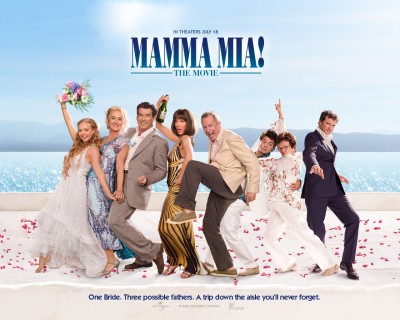| Reviews & Columns |
|
Reviews DVD TV on DVD Blu-ray 4K UHD International DVDs In Theaters Reviews by Studio Video Games Features Collector Series DVDs Easter Egg Database Interviews DVD Talk Radio Feature Articles Columns Anime Talk DVD Savant Horror DVDs The M.O.D. Squad Art House HD Talk Silent DVD
|
DVD Talk Forum |
|
|
| Resources |
|
DVD Price Search Customer Service #'s RCE Info Links |
|
Columns
|
|
|
Mamma Mia! The Movie - The Gimme! Gimme! Gimme! More Gift Set
Mamma Mia! The Movie - The Gimme! Gimme! Gimme! More Gift Set packages the supplements-filled December 2008 Blu-ray with a soundtrack CD, plus a full-color 32-page booklet.
Adapted with a few changes from the 1999 West End musical and helmed by that show's director, Phyllida Lloyd, Mamma Mia! opens with bride-to-be Sophie (Amanda Seyfried) posting wedding invitations to three men: architect Sam (Pierce Brosnan), writer/adventurer Bill (Stellan Skarsgård), and banker Harry (Colin Firth) - any one of whom could be Sophie's father. Twenty years before, Donna (Meryl Streep) slept with each in turn shortly before becoming pregnant, eventually raising Sophie on her own while managing a picturesque but somewhat dilapidated resort on the Greek island of Kalokairi. Having discovered her mother's secret diary chronicling these past affairs, Sophie wants to reconnect with her biological father, whichever one he is, in time for the wedding.
Donna is not happy when her three ex-lovers turn up, especially Sam, clearly the Man That Got Away. As her daughter's wedding draws closer, she confides her mixed feelings with old friends and former band mates Rosie (Julie Walters), an acerbic authoress, and Tanya (Christine Baranski), a glamorous multiple divorcee.
Though Sophie's longing to meet her biological father drives the plot, and while Seyfried, totally believable as Streep's daughter, is both radiant and an excellent singer ("I Have a Dream," "Honey, Honey"), the film really belongs to Streep's middle-aged single mother, her friends and ex-lovers. Except for the somewhat younger Colin Firth, all of those actors were in their mid-to-late fifties when Mamma Mia! was in production. (And, incredibly, despite the schoolgirl level of energy she exhibits throughout, Streep herself was 59.)
The film's detractors found fault with its thin, contrived story but these same complaints could be levied at classical Hollywood musicals like An American in Paris, Oklahoma!, and Gigi, to name three famous examples. The picture's use of a literal Greek chorus and its Aegean setting - supposedly the site of Aphrodite's fountain - are the most obvious indication that Catherine Johnson's story is cleverly patterned after classical Greek theater.
More importantly, as with many stage and movie musicals, plot and realism are secondary concerns subservient to emotional verisimilitude, and it's here where Mamma Mia! really works its many charms. Despite its light and occasionally campy tone, via ABBA's songs the characters express their feelings of regret, bitterness, sorrow, longing, nostalgia - a wide range of emotions. That some of the songs' lyrics don't perfectly match what's happening on screen is immaterial - what matters is that the authentic emotions connect with the audience; they did with this writer. One terrific example of this is Streep's performance of "Slipping Through My Fingers," with Donna reflecting on losing her adult daughter to marriage, sung as she watches Sophie dress for her wedding ceremony. It's a moment all parents can relate to.
Streep is terrific. She's a fine singer, it turns out, while her great skills as an actress and her capacity to interpret the lyrics compensate for her minor shortcomings. Her energetic, giddy, earthily sexy performance almost overwhelms the film's early scenes: she's almost like Julia Roberts in one of her vehicles, during those inevitable pop standard musical interludes.
Everyone does his or her own singing; no Marni Nixons here. Critics were especially unkind to Pierce Brosnan; one opined that he sang, "as if he's being subjected to a prostate exam just outside of the camera's eye." He's not that bad at all, not all that great but passable; I think it's more a case of Brosnan's style seems to equally combine elements of Tom Waits and David Bowie, very disconcerting against his more conventionally handsome, button-down screen persona.
The location photography, mostly on the island of Skopelos and the hamlet of Damouchari, is lushly beautiful with bright colors that reflect the film's sunny tone. For practical reasons, almost all the footage - interiors as well as exteriors - of Donna's resort was actually filmed on Pinewood's 007 soundstage, on a massive set with an expansive courtyard. The set is convincingly lit, but the filmmakers opted to green-screen the background representing the skies above, etc. and this looks so phony as to only draw attention to itself. (I half-expected to see the Millennium Falcon fly by.) Filmmakers these days seem to think computers can do anything, but in this instance a carefully painted cyclorama probably would have been more convincing. (Conversely, the film opens with superb day-for-night photography, also enhanced with the aid of computers.)
But these are minor quibbles. This is an infectious musical in the best sense of the word. After a somewhat overbearing start - especially early scenes with Streep's character - it's hard not to surrender to the film's mostly joyous sensibility. I was surprised that, visually, it has much less in common with classic Hollywood musicals or recent music videos than with the emerging-in-the-west Bollywood style, particularly in terms of its choreography, its use of color, the staging and cutting of both its big numbers with lots of extras, and its more intimate pieces.
Video & Audio
Filmed in Panavision (2.35:1), Mamma Mia!'s 1080p transfer is up to contemporary standards, with exceptionally bright colors and excellent use of the location's pale blue water, rocky beaches and green pines. Blacks are excellent (such as those day-for-night shots), though the digital tweaking to push the film's pallet even further goes a bit overboard at times. English Audio is DTS-HD 5.1 Master Audio, with 5.1 DTS tracks in French and Spanish, along with optional subtitles in all three languages. Not surprisingly, the exacting ABBA-style orchestrations and mixing come off well.
Extra Features
The "Gimme! Gimme! Gimme! More Gift Set" comes packaged in an easy-to-crush cardboard box with one of those "press here" gizmos that lights up like a disco while playing an excerpt from the title track. Inside is a full-color booklet with a surprisingly good oral history of the production quoting all the major players and which is handsomely illustrated. The soundtrack CD, featuring 17 tracks, is in the Blu-ray case rather than its own jewel case, which is a bit awkward if, for example, you want to listen to the CD in your car, as I did. ("Should I leave the Blu-ray disc at home?" I wondered.)
The Blu-ray has the same extras as the December 2008 release: a pretty thorough audio commentary with director Phyllida Lloyd; a karaoke feature with onscreen lyrics for the film's 22 songs; deleted scenes and outtakes, a "Gimme! Gimme! Gimme!" music video, and an extended Björn Ulvaeus cameo. These are all in standard-definition.
In 1080p high-def is a quite good "Making of 'Mamma Mia"" featurette in three parts; a deleted musical number, "The Name of the Game" (also on the soundtrack CD); "Anatomy of a Musical Number," which looks at the making of "Lay All Your Love on Me"; "Becoming a Singer" (especially interesting and amusing); and "A Look Inside Mamma Mia! The Movie," which plays like a trailer.
The disc also includes Universal's signature "U-Control" features, including picture-in-picture interviews, and "Behind the Hits" trivia. In an impressive bit of technology, viewers can create their own text and/or on-camera picture-in-picture commentary track via "My Movie Commentary."
Parting Thoughts
Though flawed in minor ways overall I was quite taken with Mamma Mia!, but as a middle-aged father and admitted ABBA fan I confess to being predisposed to like the film. For those who haven't yet seen it, this Blu-ray set is the best deal, offering as it does the extras-crammed disc plus the booklet and soundtrack CD. Highly Recommended.
Stuart Galbraith IV's latest audio commentary, for AnimEigo's Tora-san DVD boxed set, is on sale now.
|
| Popular Reviews |
| Sponsored Links |
|
|
| Sponsored Links |
|
|
| Release List | Reviews | Shop | Newsletter | Forum | DVD Giveaways | Blu-Ray | Advertise |
|
Copyright 2024 DVDTalk.com All Rights Reserved. Legal Info, Privacy Policy, Terms of Use,
Manage Preferences,
Your Privacy Choices | |||||||












